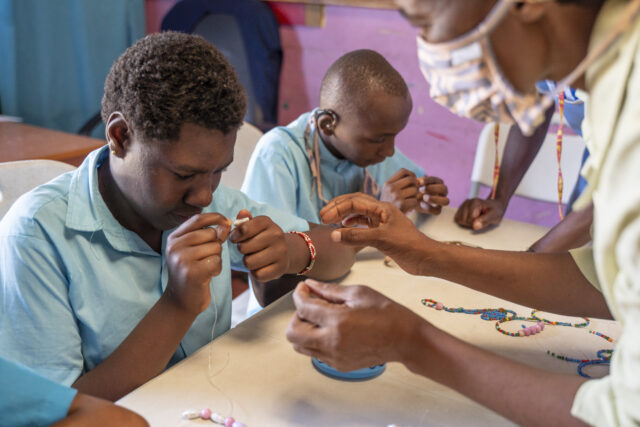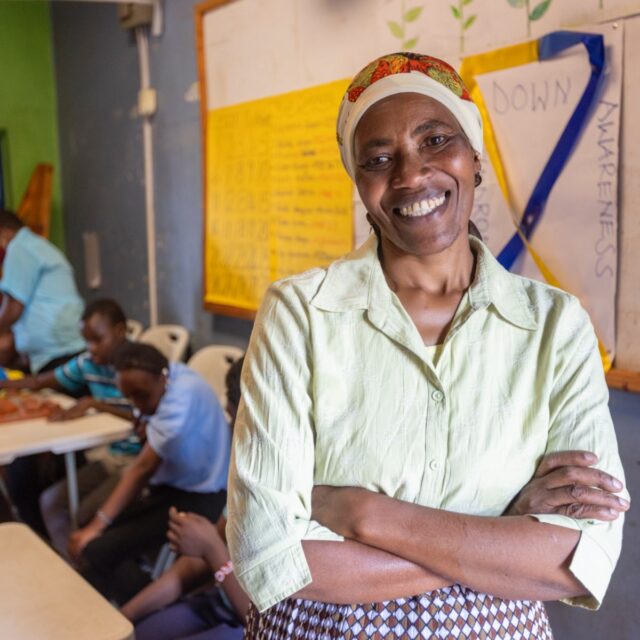Mai Mahiu is a bustling trading centre that never sleeps. It is a long-distance truck stop that sits in the shadow of a massive escarpment at the bottom of the Rift Valley, about an hour west of Nairobi, the Kenyan Capital. Here, tucked between single-story shops selling household consumables, agricultural supplies, and truck spare parts, along a dusty street parallel to the Nairobi – Kampala highway, you’ll find Ubuntu Life Education Centre.
This is where Teresia Njeri Ngugi, mother of five in her forties loves to come to
every morning, from her home a few kilometres away. It is a walk she has enjoyed taking for eight years now, after getting inspired to become an educator by one of her high school teachers, Miss Mungai, who was very friendly and caring towards her.
Today, in one of the classrooms at Ubuntu Life Centre, Teresia is paying forward the same love that was shown to her many years ago to her students today— special needs children between the ages of 10 and 18.
She is helping them develop their motor skills as they make jewellery pieces. Teresia is moving from desk to desk, helping her students push knitting yarn through tiny bead holes to make colourful bracelets and artistic necklaces. The results not only impress Teresia, but the young creators as well who are modeling their masterpieces to one another.
The sounds of excitement the students make drown the sounds of trucks passing by outside the classroom. Though loud, it is a welcomed sound that was missing at Ubuntu Centre for most of 2020.

Teresia Njeri Ngugi attends to special needs pupils aged between 10 and 18 years.
Taking care of special needs during COVID-19
When the first case of COVID-19 was reported in Kenya on 12 March 2020, the government ordered the closure of all learning institutions across the country as measures were put in place to stem the spread of the coronavirus. Students were sent home as the Ubuntu Centre was closed, awaiting reopening instructions from the Education Ministry.
While staying at home reduced the chances of pupils catching the virus, it did affect them psychologically, as they missed the camaraderie, fun, and sense of belonging that learning that the Ubuntu Centre offered.
After several weeks of staying at home and with no sign of the crisis ending, the management at the Ubuntu Centre met and decided to adapt to the coronavirus restrictions by changing how learning was conducted.
“We came together as an organisation and decided to revise how we took care of the children here at the Centre while making sure their health and safety remained a priority,” Teresia said.
“We decided to switch from classroom to individual learning. We had two dedicated teachers, each attending to only one child at a time. Each teacher attended to no more than two pupils every day. We also instituted 30-minute breaks between pupils to sanitise surfaces and teaching materials that we were using” said Teresia.
Handwashing stations were set up around the Centre, sanitizer bottles were placed in each class, and a mandatory face mask and social distancing policy was put in place by the Centre’s administration.
Coming together again
When learning officially resumed at all schools in Kenya last October, Teresia noted that the pupils were very happy to be in each other’s company after seven months of little to no interaction with each other. During the March to October break, some parents had opted not to bring their children to the Centre even with the COVID-19 protocols that had been put in place. This meant that there was a lot of catching up to do for the pupils who had been away from school for long.
“Despite some pupils having regressed, we noticed that when they came back, their minds were refreshed, and there was a marked improvement in life and communication skills. We believe this was because of the time the pupils got to spend with their parents who were also at home during the lockdown, and siblings who would have otherwise been away in boarding schools,” Teresia said. For the students of the Centre, the pandemic came with a silver lining.
Learning at Ubuntu Centre went on well from January to March 2021, with parents dropping off their children in the morning, Teresia and other teachers sharing life skills with them during the day before the students returned home with their parents in the evening. This was until 26th March 2021, where under a Presidential Directive, all learning institutions, including the Ubuntu Life Centre, were closed as Kenya experienced an increase in coronavirus infections that had put an unbearable strain on the country’s health system.
Teresia now waits for the next Presidential Directive to be issued at the end of April 2021 to know if she can get back to paying forward the same love and care to her own students that inspired her to become a teacher today.
How you can help
School closures and the challenges of remote learning due to the pandemic have greatly impacted children’s education globally, from Nairobi all the way to New York City. Even prior to the pandemic, 90% of 10-year-olds in low-income countries couldn’t read or understand something simple, like a school test or health leaflet.
Now, because of the pandemic, that number is at risk of increasing, with the potential for girls, in particular, to fall through the cracks. That’s why we must act now — and you can help.
As world leaders meet to come up with a global response to the learning crisis, join us in asking them to invest in quality education for all children, regardless of where they live. Because the children of today, are the doctors, leaders, and scientists of tomorrow.



